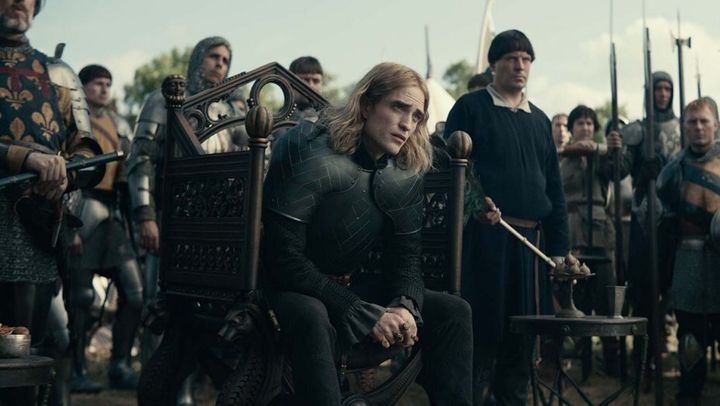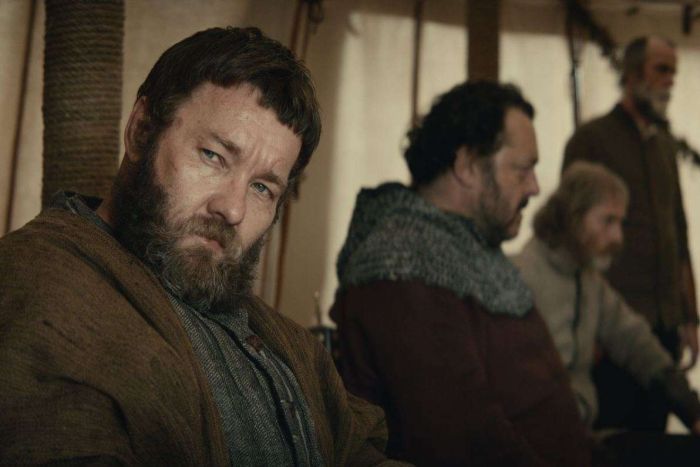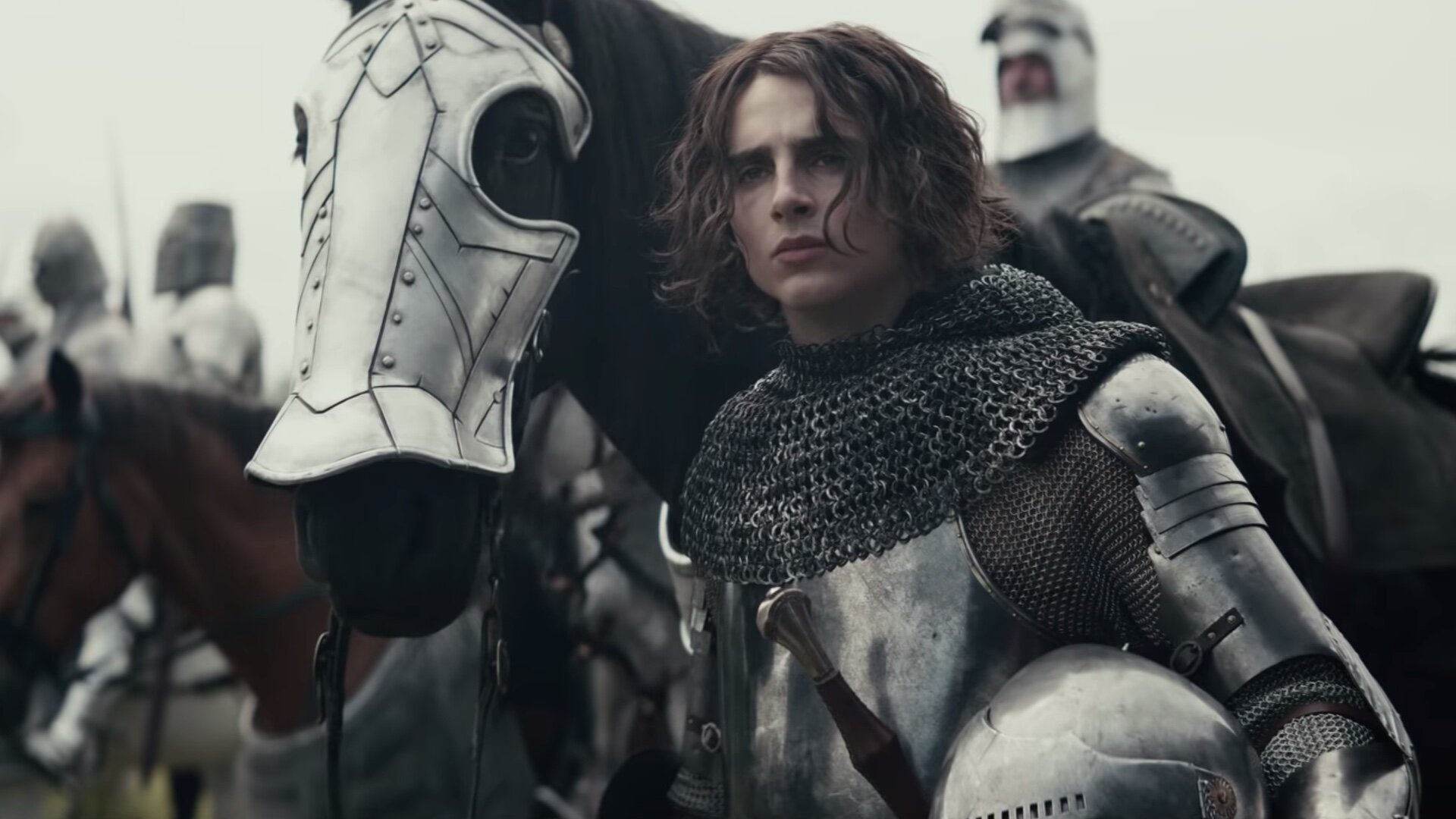I literally don’t remember taking off, or landing. These things happened in there somewhere amongst the chain-mail, the mud, the horses, the blood, and the screaming. I’m not sure where really. But they must have happened, seeing as though I’m 1,800 miles away from where I was one movie ago. You see, because The King is the perfect movie for Shakespearean history buffs out there. If you know anything about England, France and the Hundred Years war, or enjoy an epic battle sequence, this movie is also for you. But really, having been a student of Shakespeare’s Henry V, and a fan of numerous and different versions. To see a more true-to-life telling of the same story was really eye-opening.
First things first, you can skip my extraordinarily boring history lesson, as well as my sycophantic plaudits, and cut straight to the chase by clicking this link and just watching it for yourself. If you’ve seen it already – but don’t fully grasp the goings on, never fear! You are in the right place. And if you just want to blame someone for watching this boring tripe, I can be that whipping boy too if you’d like. Though, truth be told, you are the one that deserves the whippings if you’ve come looking for a patsy. Not enjoying this film would be baffling to me. Though, I expect, most won’t.
So, do be careful. If you aren’t a history fan. Or if you aren’t a Shakespeare fan. Or if you like your medieval stories of the more cartoonish variety. Don’t watch this film. It won’t work for you. It’s way too boring. Way way too realistic. There isn’t a single super hero in this entire movie. No Thanos. No Flash Gordon. (Wait, what?) Nothing. Just mud, and axes, and a king who doesn’t want the crown.
Netflix’s The King Movie Walkthrough
Believe it or not, Netflix’s The King actually helped me make heads or tails out of Shakespeare’s Henry V (and Shakespeare’s wider Henriad – yes, I’m about to go über Shakespeare geek on you, [just skip a bit brother] – which means his 8 plays: Richard II, Henry IV part I, Henry IV part 2, and Henry V, Henry VI part I, Henry VI part 2, Henry VI part 3, and Richard III.) As a teen, I just took the weird bravado, and tennis balls, as just the strange facts of life of the day. But if you think about it, Shakespeare’s play Henry V works more as a jingoistic marketing machine than it does as historical fact. Because, if you attempt to literally add up Shakespeare’s plays, the 1 plus 1 plus 1, you don’t end up with three when it comes to the play. It just doesn’t add up. Even a little bit. But The King, brought to you by Joel Edgerton (of the Great Gatsby and It Comes at Night) and David Michôd? Oh, not only does it add up, but it actually works as literal history from top to bottom.
As the movie spins up – Henry, the Prince of Wales (or as the movie refers to him as Hal (Not to be confused with HAL from 2001(?!?!)) has gone missing. He’s left his father to his political chaos, and ill advised machinations, and abandoned his brother Thomas to have the throne he doesn’t want. Hal (played by Timothée Chalamet, of Lady Bird, Call Me By Your Name, and the upcoming Dune, and Little Women. Uh, this kid is amazing, and is absolutely going places.) has taken to hanging out and drinking with John Falstaff (played by Joel Edgerton of the aforementioned It Comes at Night – cough – maybe you should go watch it? I don’t mention things twice for MY HEALTH?!) and basically doing nothing. But then he is summoned by his father to officially take the throne from him. And when he learns that his brother is heading out to subdue Hotspur’s rebellion, and most likely die a painful death, he interjects himself and challenges Hotspur to a battle of single combat.

Now. Here’s where the magic of this movie begins. Normally, when two knights on the silver screen, lock in single combat, pigeons are released from behind them – in slow motion no less. And the sun escapes the bounds of the clouds. And we watch as the sparks individually escape the clash of the swords and spray heavenward. But here? The “battle” rapidly devolves into a pig-slop, fist fight. And it’s probably the most accurate knight battle I’ve ever seen on film. I mean, really? What a horrible way to fight someone!! While armored in a hundred pounds of mail and plate? Are you crazy? It wouldn’t have been pretty at all. And ultimately, it ends with Hal shivving Hotspur repeatedly in the neck, under the gap of his helmet.
Now, Thomas, Hal’s brother is mortified that his half-wit non-king worthy of a brother upstaged him on the battlefield. I mean, he’s trying his best to be king-worthy for his dying father. But Hal just keeps walking onto the field, saving his life, and murdering his own sworn enemy. GAH! But, don’t worry – because between cut scenes, and off screen, we learn that Thomas dies on another battlefield that Hal wasn’t omnipresent enough to save him at. Worse? His father, Henry IV dies in his bed – which screws up Hal’s plan of whoring and drinking his way to an early retirement. And so he takes the crown.
Brilliant. I love it.
Now Henry the fifth decides, peace will be his way. He will make reconciliation regardless of his being seen as weak. And even when the Dauphin of France sends a ball as a coronation gift, he still chooses not to take offense. He chooses to look away from this affront from the country that England has been at war with for well over a hundred years (thus the name – The Hundred Year War. I know, clever, right?) Soon after an assassin, who seemed to have been sent by France to murder Hal, is discovered. Simultaneously, French agents try to flip several of his nobles. And with that, he has been insulted one too many times – and declares war on France.
As Hal burns his way across France (sacking Harfleur with trebuchets and stern looks mainly, etc etc) he is nipped at by the Dauphin at every turn. And at Agincourt, where the English accidentally stumble upon a much larger army, Hal has to decide whether he should listen to his nobles, who are advising him to turn and run. Hal decides to try and give the Dauphin an out – but his pride refuses the offer. And when Falstaff proposes a false advance by knights in heavy armor Hal has his plan of attack. And so, this false front lures the French to engage 100%, and in turn, get trapped by the mud of the recently rained on field. Sure enough, the Dauphin is tricked into fully committing, and is then hit with the English longbow, and also men in light mail that come running out of the trees. At the end of the battle, the Dauphin challenges Hal to single combat, but can’t even stay upright on the muddy field, and is murdered by the men after making a fool of himself. But, from a historical standpoint, the Dauphin (or Louis as his name was called) suffered from flights of madness, and sat the battle of Agincourt out. Only to die of dysentery a few months later. Otherwise, The King beats the sniff test for being more truthful throughout.

The Ending of The King
Now with 30 minutes left to go, the Battle of Agincourt is over. And I’m like, eh? What’s left? This is the penultimate battle in England’s push back against France. It’s done. What else is there? The people of London should be carrying him on their shoulders while blimps and billboards overhead proclaim England as the victors. Wait, WAHT?
Except, the movie take the opportunity to investigate the surrender of King Charles VI, and the marriage between Hal and his daughter Catherine of Valois. Immediately upon their return to England, Catherine begins challenging Hal’s assumptions for invading France. (Remember? The ball coronation gift, the assassin, and also the infiltration of his court?) Well, Catherine is of the mind that neither her father, or brother, sent an assassin to kill her future husband. And that’s when something clicks for Hal – and he goes to speak with his chief Justice Gascoigne. And when Gascoigne confirms that he lied to trick the King into war with France Hal stabs him in the back of the head. And with that, Hal asks his wife to always be honest with him.
Now, seeing as The King is basically is a 100% remake of Shakespeare’s Henry V (basically anyway), but from a more modern, and more realistic vantage point. Which means that the ending was probably fairly significant. And if you look at Shakespeare’s version of events, he made light of the soon to be marriage between Catherine and the King by showing Alice teaching Catherine English in a fairly humorous scene (really one of the funniest scenes in all of Shakespeare’s corpus, but you have to know French to get it.) But instead, in The King, we see that Catherine already knows English, and instead of being a giggling maiden, she tells her new husband that he is going to have to earn her respect. And then, with her sharp scalpel of an insight, dismantles his assumptions for his wars with France. And just like that his logical defense of his “Just War” falls apart.
This is such a surprising moment! Why? Well, because usually, Agincourt is heralded as the single biggest accomplishment on the battlefield for England. But in one fell swoop, 600-year-old Catherine dismantles all of England’s assumptive imperialistic domination’s going forward from there. Do you see? I don’t know if I said that right. In 1415, England was important…but its star would rise much much higher as it became a global imperialistic dynasty in India, the Americas, Africa, etc. And here Catherine is subtly saying, what exactly is your excuse for going to war with France? You were goaded into it? By whom? France? Or yourself? And were you really trying to distinguish between the two? Or did you prefer to just have your excuse?
It’s as if this movie is calling out England’s international policies since 1415 onward. You say that you only care about your own internal well being. And yet, here we are. How exactly did we get here? And that same question could be applied to every single county (especially the United States) as well. This isn’t singly a British thing, like at all. It’s an interesting twist at the end that just pops the lid off the entire movie, and calls it all out as lies.
It’s a fantastic ending. One that walks away from the Shakespearean sexism and hands the cantilever roll to the one real woman of the entire movie.
Edited by: CY

